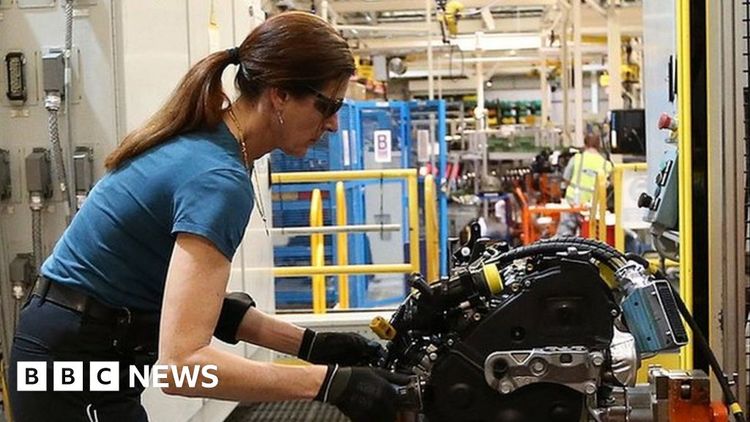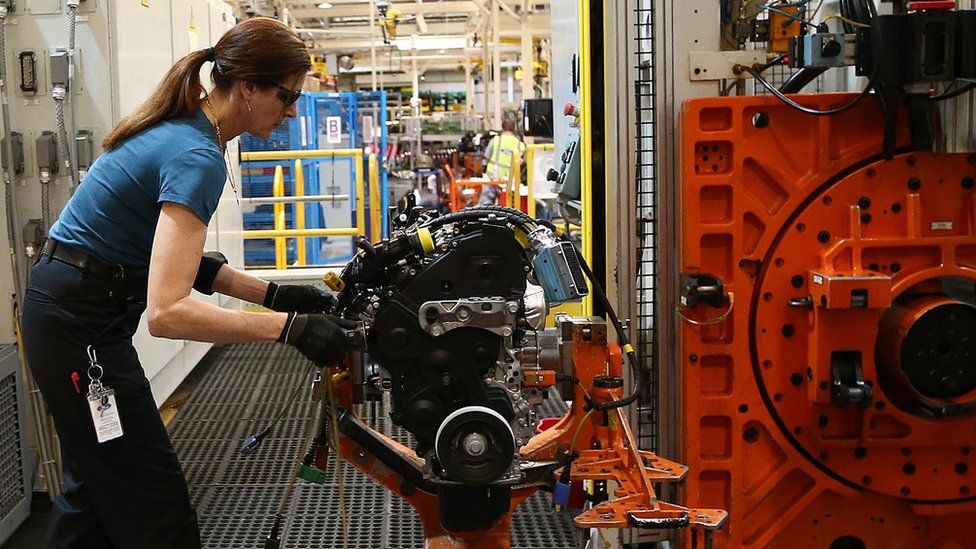UK faces ‘heightened recession risks’ as interest rates bite

Source of the image, Getty Images
UK manufacturing experienced a significant decline in August, marking its largest decrease since the implementation of covid measures.

A widely observed survey indicates that the UK economy is on track to contract from July to September, potentially leading it into a recession.
According to the PMI report by S&P Global/CIPS, the month of August witnessed a significant decline in the demand for goods and services due to the increase in interest rates and a decrease in household spending.
The list examines crucial economic indicators including requests and workforce participation.
The data indicated a decrease in activity during the month of August following a continuous period of expansion lasting half a year.
This month, the reading on the index is 47.9 which indicates a contraction. It is the lowest level seen in two and a half years.
According to economists, the PMI data, which assesses the state of an economy, indicated that the Bank of England's initiatives to control inflation were starting to yield positive results.
After the PMI report was published, the value of the pound declined compared to the dollar, and financial experts in the City revised their predictions for the highest point that the interest rate would reach, lowering it to 5.5% from 6%.
The current interest rates are 5.25%, which have risen steadily since the end of 2021 when they were nearly at zero.
Nevertheless, according to Chris Williamson, the main economist for business at S&P Global Market Intelligence, the data also indicates that "the effort to combat inflation is resulting in significant dangers of recession."
He stated that it seems unavoidable that the economy will experience another decline, as the manufacturing industry's downturn worsens and the service sector's attempted comeback loses more momentum.
Based on the latest statistics provided by authorities, the inflation rate in the United Kingdom stood at 6.8% during the month of July. This figure, while a bit less rapid than the previous month, remains over three-fold above the desired 2% target set by the Bank of England.
The Monetary Policy Committee of the Bank has consistently decided, for 14 consecutive occasions, to increase interest rates. The rationale behind this decision is that by elevating the cost of borrowing funds, it will deter consumers from spending excessively, ultimately leading to a decrease in price inflation.
Nevertheless, consistent increases in interest rates have a tendency to impede economic expansion, given that it becomes costlier for both consumers and enterprises to obtain loans and make purchases. Additionally, companies may opt to reduce investments and job opportunities.
Paul Dales, an economist at Capital Economics, expressed that the survey results would provide a positive outlook for the Bank and confirm the effectiveness of increased rates. However, he also predicted a forthcoming decline in economic activity and foresaw the onset of a minor recession.
Based on the Purchasing Managers' Index (PMIs), the United Kingdom experienced a decline in economic output within the manufacturing and services industries during the month of August.
According to Rhys Herbert, a top economist at Lloyds Bank, the unexpected decrease in retail sales during July indicates the potential for more decline as we transition into autumn.
According to Mr. Herbert, certain companies are still facing difficulties in hiring new employees, which in turn is causing salaries to rise.
Salaries have seen a substantial surge in recent times, however, the Bank of England has cautioned that this increment in wages will pose challenges in curbing inflation.









































